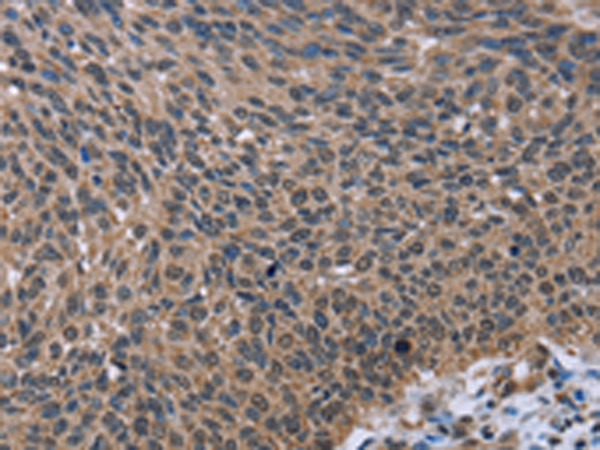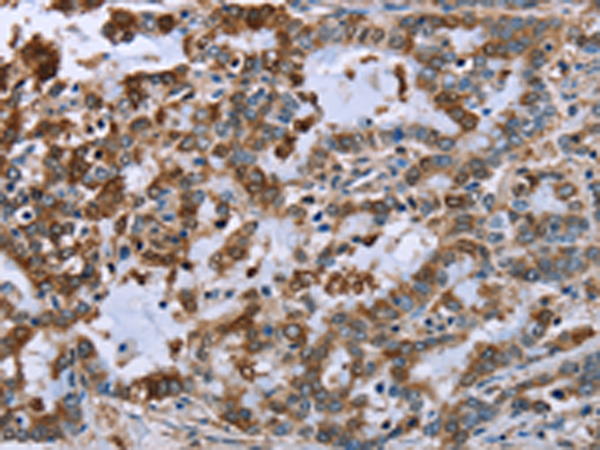


| WB | 咨询技术 | Human,Mouse,Rat |
| IF | 咨询技术 | Human,Mouse,Rat |
| IHC | 1/25-1/100 | Human,Mouse,Rat |
| ICC | 技术咨询 | Human,Mouse,Rat |
| FCM | 咨询技术 | Human,Mouse,Rat |
| Elisa | 1/2000-1/5000 | Human,Mouse,Rat |
| Aliases | IMPD2; IMPDH-II |
| WB Predicted band size | 56 kDa |
| Host/Isotype | Rabbit IgG |
| Antibody Type | Primary antibody |
| Storage | Store at 4°C short term. Aliquot and store at -20°C long term. Avoid freeze/thaw cycles. |
| Species Reactivity | Human, Mouse, Rat |
| Immunogen | Fusion protein of human IMPDH2 |
| Formulation | Purified antibody in PBS with 0.05% sodium azide and 50% glycerol. |
+ +
以下是关于TAF15抗体的3篇参考文献及其简要概括:
---
1. **文献名称**: *TAF15 is critical for the cellular stress response and regulates RNA transcription in neurodegenerative diseases*
**作者**: Neumann M, et al.
**摘要**: 本研究利用TAF15特异性抗体,通过免疫组化和Western blot技术,揭示了TAF15在额颞叶痴呆(FTLD)和肌萎缩侧索硬化症(ALS)患者神经元中的异常聚集。研究强调了TAF15在细胞应激反应和RNA代谢中的关键作用。
2. **文献名称**: *Characterization of FET family proteins in cancer: TAF15 as a novel oncogenic fusion partner*
**作者**: Crozat A, et al.
**摘要**: 该研究通过TAF15抗体检测了其在肉瘤中的表达,发现TAF15与其他基因的融合现象。抗体被用于免疫沉淀和质谱分析,证实了TAF15融合蛋白在肿瘤发生中的功能异常。
3. **文献名称**: *Antibody-based profiling of FET protein dynamics in stress granules*
**作者**: Andersson MK, et al.
**摘要**: 本研究开发了一种高特异性TAF15单克隆抗体,用于共聚焦显微镜观察。结果显示,TAF15在应激颗粒(stress granules)中与FUS和EWSR1共定位,提示其在RNA加工和应激调控中的协同作用。
---
这些文献涵盖了TAF15抗体在疾病机制、肿瘤研究和细胞生物学中的关键应用。如需更多文献或具体细节,可进一步检索PubMed或Web of Science数据库。
TAF15 (TATA-box binding protein-associated factor 15) is a member of the TET family of RNA-binding proteins, which also includes FUS and EWSR1. It functions as a component of the RNA polymerase II transcriptional machinery, playing roles in transcription initiation, RNA splicing, and DNA damage response. Structurally, TAF15 contains conserved RNA recognition motifs (RRMs) and a prion-like domain, enabling its participation in liquid-liquid phase separation and formation of membraneless organelles like stress granules.
Antibodies targeting TAF15 are critical tools for investigating its expression, localization, and molecular interactions. These antibodies are widely used in techniques such as Western blotting, immunofluorescence, and immunoprecipitation to study TAF15's involvement in cellular processes and disease pathogenesis. Dysregulation of TAF15 is linked to cancer and neurodegenerative disorders. For instance, chromosomal translocations involving TAF15 (e.g., *TAF15-NR4A3* in extraskeletal myxoid chondrosarcoma) generate oncogenic fusion proteins, while cytoplasmic mislocalization of TAF15 is observed in amyotrophic lateral sclerosis (ALS).
TAF15 antibodies are often validated for specificity against its unique N-terminal domain or shared C-terminal regions. Researchers also utilize these antibodies to explore post-translational modifications (e.g., phosphorylation) and interactions with partners like RNA polymerase II or spliceosome components. Their application advances understanding of TAF15's dual roles in transcription-coupled genomic stability and RNA metabolism.
×